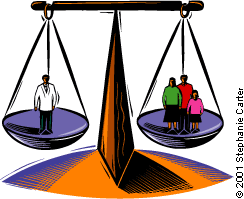
How do family physicians balance their personal and professional lives? We decided to ask the experts – you!
Fam Pract Manag. 2001;8(6):60

In an environment that continually asks physicians to know more, do more and be more, is it really possible to practice good medicine and still have something left at the end of the day to be a mother, father, wife, husband, partner, son, daughter or friend? Recently, we decided to give our time-management experts a break and take that question straight to the source: you. We asked family physicians to write to us with their own tips for maintaining life balance and for getting more satisfaction out of their busy lives. Here’s what they said:
1. Don’t try to be too efficient. Take time to really listen to a couple of patient stories a day. We need to be fed by our patients.
2. When recruiting for your practice, interview for emotional competence as well as professional competence. Ask questions such as, “What makes you satisfied? What do you find upsetting? How do you deal with the death of a much-loved patient?” Candidates who can answer questions like these have done some significant personal reflection and are likely to continue to grow and be assets to your practice and patients.
3. Take a few minutes at the end of the day to think about the things that really bugged you. Make a list of them, if you need to, and then leave it at the office.
4. Seek insight from your elderly patients. Ask them how they’ve dealt with their struggles and disappointments. Their wisdom may be surprising.
5. Sometimes say, “This just isn’t going to get done today,” and work on accepting it.
6. Take regularly scheduled days off. Your patients and your staff will eventually expect you to be off and unavailable during that time and, since it’s been worked into your schedule, you won’t have to feel guilty for being out of the office.
7. Share with your patients your struggle to find balance in your life. It’s likely they’ll respond with uplifting words and concerned advice.
8. Ask your family what they need most from you. It may be something different than you think. (Ask your office staff too.)
9. When you’re out socially with colleagues, make a real attempt to talk about things other than medicine. It will remind you that there’s a world out there.
10. Learn when to multitask and when to focus wholeheartedly on things that deserve your full attention.
11. Eat at least one meal a day with your family or with a friend.
12. Develop a support system. Everyone needs family and friends to rely on, but baby-sitters, house cleaners and someone to take care of the lawn can also do a lot toward relieving stress!
13. Don’t get into the habit of going into the office on the weekend “just to get caught up.” It’s rare to get caught up and rarer still to stay that way. Tell your friends and family that you’re trying to break this habit so they can remind you of it when you get the urge to go to the office.
14. Make friends with a few people who will agree to never ask you to be their doctor!
15. Remember that life balance is a shifting concept and you’ll learn from your attempts to maintain it. Some days will be better than others.
16. Ask yourself a simple question, “Is doing ________ going to make me wish I was home with my family?” If so, graciously say, “No thanks, someone else will have to do it.”
17. Realize that each one of us has our own mountain to climb. Try to remember to pause to enjoy the view along the way and to help and let yourself be helped by others you meet on the path.
By sharing some of your colleagues’ tips with you, we hope you’ll connect with – and act on – at least one. Whether it’s learning to say no, remembering the big picture or hiring someone to mow your lawn, just one simple change may make your life easier, more meaningful or more rewarding.